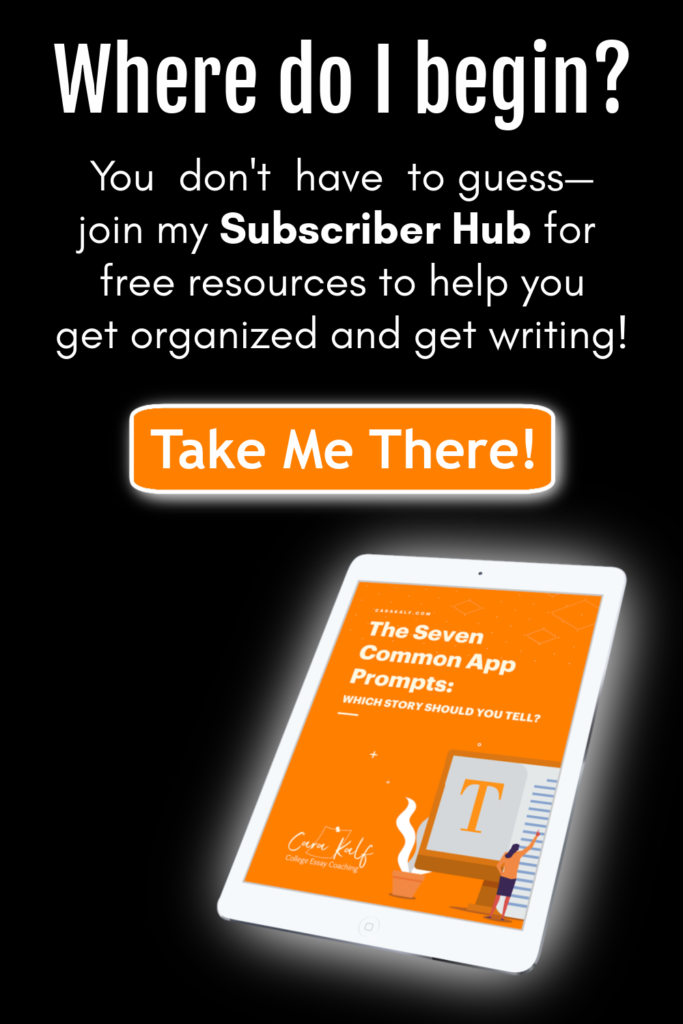How Do I Start My College Essays?
It goes without saying that the first thing you need to do to start your college essays is—to start. But nothing helps a procrastinator to procrastinate like an unclear expectation. The vague language of the seven Common App prompts give too many choices and not enough direction to push past procrastination and the fear of having nothing to say.
It’s like asking, “What’s the dress code?” and being told, “Oh, wear anything!” That may seem thoughtful, but actually, you’ve just left guests wondering if they’ll be overdressed or underdressed compared with others.
Or that restaurant with the six-page menu? Are you really going to be happy with the pad thai, or should you go for something new? It’s so hard to tell!
With the Common App prompts, it seems like you should just be able to sit down and write. Sure, “a period of personal growth.” I’m sure I’ve grown in my life. “BRAIN! When have I grown?”
The problem is, your brain doesn’t do hearts or hashtags. It doesn’t even do a card catalog. (Look it up. It’s what we used to call Google.) Your brain is like the pile on the corner of your desk. You know what’s there … more or less … but not necessarily where it is. And when it comes time to clean it up, there are always surprises. (Unpaid dentist bill: Bad! Uncashed birthday check: Good!)
If you are going to brainstorm well for your essay, you need to go through that pile pretty thoroughly. You may have several essay possibilities you didn’t initially think of or consider, and one of them might actually be perfect. But you’ll never know until you consider it.
The point of a writing prompt is to prompt your thinking, or give your brain a nudge in the right direction. I say, “Write about your first pet,” and your mind searches the files (#pet) and brings up Oscar, the red and bellicose betta fish (#truestory). Simple.
So when you read a prompt like, for example, “Write about a time when you questioned or challenged a belief” (#prompt3), and your mind brings up a total blank, you assume it’s you. Apparently you’ve never challenged a belief before. Nothing to say.
Of course, that’s ridiculous.
The problem with “questioned or challenged a belief” is that it’s too broad to successfully prompt a memory. Even if your brain is using hashtags, they’re really basic (#swimming), or at least ones you reference (#fightswithfriends). It’s not likely that you ask your brain for #challengingabelief with any regularity, so it hasn’t sorted your memories in that way.
What about #failure (#prompt2)? You’ve certainly got a tag for that one. The problem is the tidal wave of hits you get when you try it. Your brain might ‘freeze’ like an overloaded server and return nothing. Or it might start giving you answers in random order, at which point your internal editor—like a sniper waiting on the rooftop—picks off the options one by one.
“You failed to parallel park yesterday,” your brain reminds you. “That’s stupid,” the editor replies.
“You failed the math test this spring,” your brain reminds you. “That’s not important enough,” the editor replies.
“You didn’t turn in your Eagle project on time,” your brain reminds you. “That’s too embarrassing,” the editor replies.
And with that, the brainstorming process is shut down.
So what do you do about it? Somehow, you have to brainstorm these prompts!
Take a deep breath. The first thing to do is relax. No matter how many times the procrastinators say it, it is not true that the human brain performs best under pressure. Especially when it comes to creative thinking, you have to loosen your grip on the process just a bit.
The second thing is to get to know the prompts better. Using the prompts to brainstorm can be helpful, but only if you understand what they’re asking for. That’s why I wrote my in-depth article “The Seven Common App Prompts: Which Story Should You Tell?” It’s like a guided tour of the prompts, with specific tips to help unblock your ideas. I also tell you my two favorites—and the prompt I’ve never seen written successfully. Download it today, and stop asking how to start your essays. Start thinking about finishing them!
Yes! I want the guidance that will help me brainstorm my best Common App essay.
How do I start my college essays?
-
-
- Identify which main essay you need to write. The vast majority of students apply through the Common App, but your first-choice school might require something different. The Universities of California, for example, have a completely different writing requirement.
- Brainstorm widely. The most common mistake students make is to grab for a topic like a life preserver in a storm. You don’t need to write the first idea that comes to mind. Even if your deadline is approaching, choosing the right topic is crucial for both ending with a good essay and for making the writing process go more smoothly.
- Understand what the prompts are looking for. The Common App prompts are phrased to encompass a broad array of stories, and as a result, it can be hard to use them to actually prompt specific memories. That’s why I’ve written extensively on the prompts and different ways to think about them, allowing students to find the right prompt to tell their story.
-
(Photo by Rich Tervet on Unsplash.)


